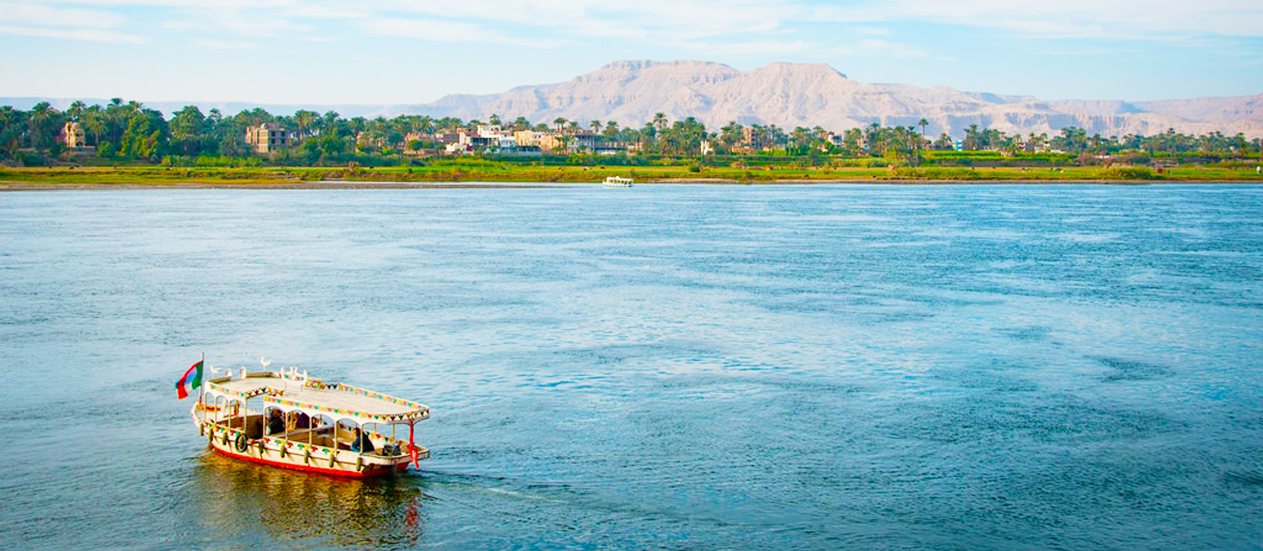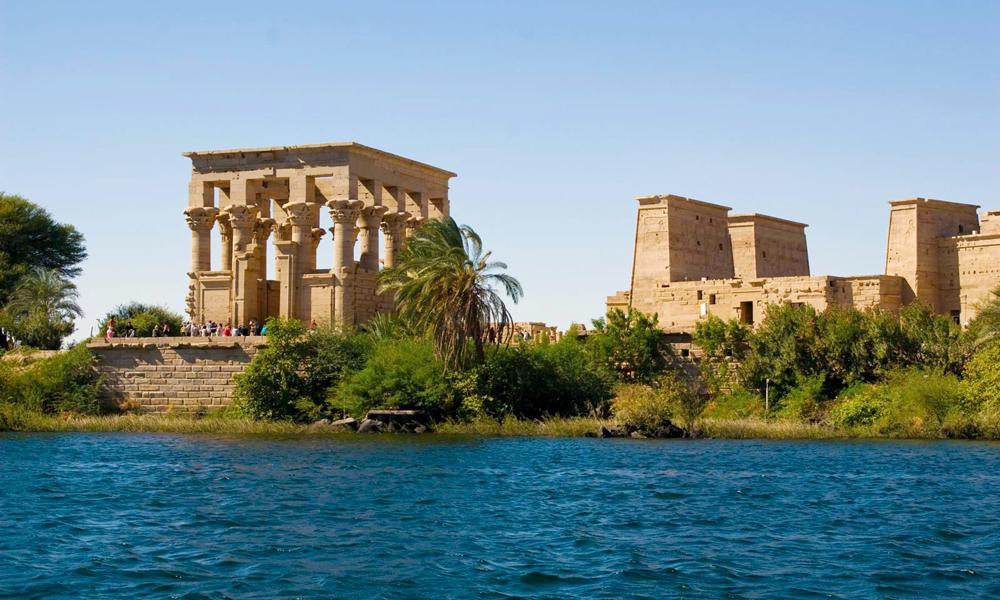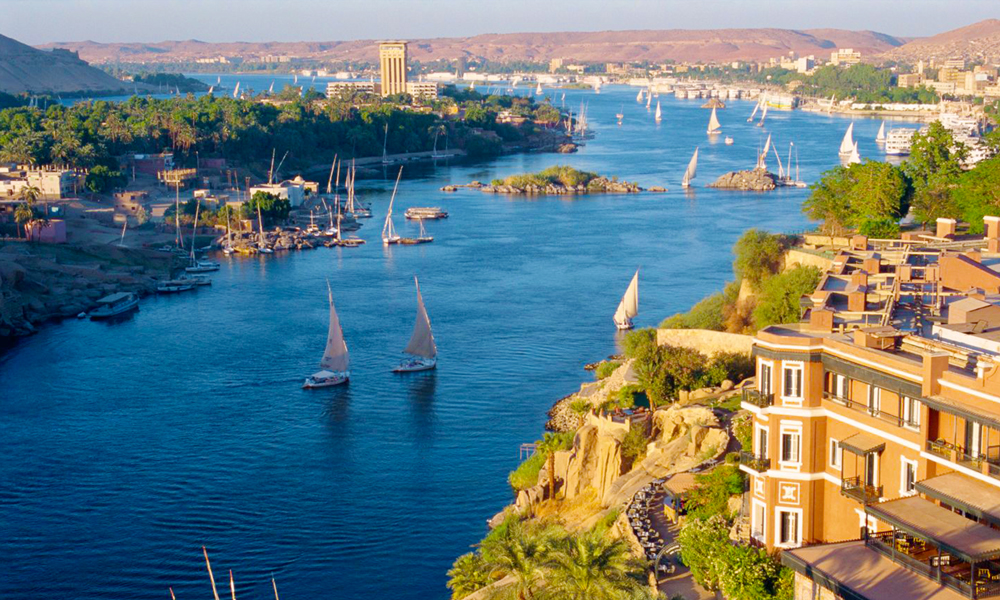- Local Time: 12:23 AM
- Weather: 31 ℃ / 88 ℉

The Nile River is a living miracle and the giver of life for every soul in Egypt. The purpose of this article is to offer every traveler all the facts, information, and details about the effect and history of The Nile River. This article was written by a group of very skilled team of tour operators, tour guides, and researchers who know all the information concerning the great Nile River. Since the dune of civilization, thousands of years ago, the Nile river has represented the main source of irrigation that transformed the dry area around it into lush agricultural land. Till this current moment, The river continues to act as the source of irrigation, as well as an important transportation and trade route. The Nile River in Egypt represents a bond that connects all families together around the water from the riverbank and is surrounded by ruins left by ancient civilizations.
“Egypt is the Gift of the Nile” is an old saying passed spontaneously through the minds of most people all over the world without paying attention or realizing its real meaning or importance. There is no natural landmark in the world that can capture the imagination just like the Nile River. The Nile River is more than just a river but a gateway to the heavens and a means of communication between a wide variety of nations from Lake Victoria to the Arabian Desert and the Nile delta.
To fully comprehend the meaning of this saying, you have to understand all the information related to the Nile River and in this article, you will learn:-

The Nile River begins in the rivers that flow into Lake Victoria which is located in modern-day Uganda, Tanzania, and Kenya, then empties into the Mediterranean Sea more than 6,600 kilometers (4,100 miles) to the north which makes it one of the longest rivers in the world. The Nile River is the ultimate waterway as it links the countries of the Nile Basin that covers 11 African countries which are:-
The Nile River is the main water source in all these countries which its water is pumped from two tributaries they are:-
1. The White Nile
The major stream starts from the Great Lakes in Central Africa.
2. The Blue Nile
The primary springhead of ninety percent of water.
And silt that flows at Lake Tana in Ethiopia than the two rivers join together in northern Khartoum, the capital of Sudan. Nevertheless, Lake Victoria is Africa’s largest lake which still remains regarded as the most essential source of the Nile River. The Nile River in Egypt extends from the northern limits of Lake Nasser in Aswan to the north of Cairo where the Nile is divided into two branches Damietta and Rosetta forming the Nile Delta.
The Nile Delta is one of the largest river deltas on Earth with about more than 40 million inhabitants which split into Branches.
The Nile in Egypt extends from the northern limits of Lake Nasser in Aswan to the north of Cairo where the Nile is divided to form the Nile Delta into two branches:
The Damietta branch.
The Rosetta branch.
It is 161 km (100 miles) long from north to south and spreads out along 150 miles (241 km) of the Egyptian coastline from Alexandria in the west to Port Said in the east.
 The Nile's name is derived from the Greek word "Nelios", which means the river valley. But the ancient Egyptians called it Ar or Aur, which means "black," a reference to the rich, dark sediment that the Nile's waters carried all the way from the Horn of Africa northward and deposited in Egypt as the river flooded its banks each year in late summer. The surge of water and nutrients turned the Nile Valley into productive farmland and was the main reason behind the rise of the Egyptian civilization to develop in the heart of a desert. The ancient Egyptians divided their country into two parts; the first part Kemet, the "black land" of the Nile Valley, contained life in the image of water and food for cities to thrive and build and the second was the hot, dry desert areas which were known as Deshret, the "red land.".
The Nile's name is derived from the Greek word "Nelios", which means the river valley. But the ancient Egyptians called it Ar or Aur, which means "black," a reference to the rich, dark sediment that the Nile's waters carried all the way from the Horn of Africa northward and deposited in Egypt as the river flooded its banks each year in late summer. The surge of water and nutrients turned the Nile Valley into productive farmland and was the main reason behind the rise of the Egyptian civilization to develop in the heart of a desert. The ancient Egyptians divided their country into two parts; the first part Kemet, the "black land" of the Nile Valley, contained life in the image of water and food for cities to thrive and build and the second was the hot, dry desert areas which were known as Deshret, the "red land.".
In ancient times, the primitive Egyptians settled along the banks of the Nile River where they built simple houses and cottages for accommodation, grew many crops, and domesticate some animals and since then the first steps to the immortal Egyptian glory started. Cultivation was the starting point as the Nile River overflowed, carrying silt deposits that covered the neighboring lands along the Nile Valley and made them fertile. Wheat was the first crop the ancient Egyptians cultivated, dependant on the Nile floods as a solution to the threat of starvation and lack of food at that time. On the other side, they used some animals such as water buffalos and camels for food, plowing, and carrying goods. In brief, the Nile River is essential for people, crops, and livestock. Gradually, most of the Egyptians moved to the Nile Valley where they could get their sustenance. As the Ancestors joined together on the Nile banks, they produced the heavenly ancient Egyptian civilization, one of the greatest civilizations in all of mankind's history which witnessed building many temples and tombs with precious treasures and jewelry. The effect of the Nile River extends to Sudan where it significantly contributed to the rise of the Sudanese kingdoms.
As a part of the ancient pharaohs’ interests in the religious life and their insistence to create many gods and goddesses from physical elements, they honored the Nile River by creating Sobek “Deity of the Nile” or as it was named “Deity of Crocodile” the deity of a man with a crocodile head represented fertility, wetlands, medicine, and sudden death and the Nile River is regarded to be the sweat of Sobek. Another deity related to the Nile in Ancient Egyptian mythology is “Hapy” also known as “Lord of the River Bringing Vegetation” or “Lord of the Fish and Birds of the Marshes” the deity of yearly floods of the Nile which greatly controlled the water level, symbolizing fertility. The water deity “Khnum“, who ruled over all forms of water like lakes & rivers in the underworld, was believed to control the amount of silt that flooded the river banks each year. The overflows carried rich silt to the lands of the Nile Valley in order to cultivate crops. The Nile River served as the source of innovation and the center of life for the ancient and modern Egyptians. The Nile became known as the mother of all men and the father of life, recognized as the key to existence. In the ancient Egyptian language, the Nile was known by the ancient Egyptians as Ḥ’pī or Iteru which means “River“. Ar or Aur means “Black” which also refers to the black silt left behind after the yearly flooding. The word “Nile” was derived from two words, “Neilos” a Greek word that means Valley, and the Latin word “Nilus”. Today, The Nile in Egypt and Sudan is known as “Al-Nīl, Al-Baḥr, Nahr Al-Nīl or Baḥr Al-Nīl“. The Nile River Cruise is one of the most spiritual journeys on the planet and is considered to be the most ideal manner to explore all the allure, history, and aspects of the heavenly Nile River.
Since ancient times, the population awaited the floods very patiently each year. The Nile played a major role in ancient Egyptian life as it divided the ancient calendar into three seasons, each one consisting of four months, “Akhet” represents the flood season when the Nile overflowed, Peret is the growing season when the soil is fertile by Nile silt and Shemu which symbolizes the harvest season at the times of drought. In the modern age, the Egyptians attempted to control the Aswan High Dam to have better control over the flooding of the Nile like the Aswan High Dam in 1970 which had a huge improvement over the irrigation systems and the positive overall rise of agriculture all over Egypt.
Everything about the Nile River is rich, as its water and banks are filled with various kinds of animal life such as African tiger-fish the “Piranha of Africa“, Nile monitors, the rhinoceros, enormous Vundu catfish, tortoises, wildebeests, baboons, hippopotamuses, frogs, turtles, mongooses and over 300 species of birds. The Nile is also famed for having the Nile crocodile which remains far from the upper Nile basin.

Cultivation was the first activity that formed the foundation and pillars of the Egyptian empire. When the Nile River flooded, the water level rose, carrying the wealthy silt deposits and overflowing the lands of the valley which made them more fertile. The ancient Egyptians took advantage of the flood season to grow crops for their sustenance. They depended on some domestic animals in their life to help them in agriculture works. These animals had taken the Nile River as their permanent refuge where they found the Nile waters at all times. On the other side, the Nile was the ultimate portal for people and goods across the lands of Cairo and Africa, especially among the countries of the Nile Basin. At earlier times, the ancient used primitive boats of wood to exchange goods and merchandise through the Nile. These exchanges made economic progress which resulted in the elevation of the Nile River in importance and fame.
As mentioned before, the ancient Egyptians settled down and erected their civilization on the banks of the Nile River. Thus, most of Egypt's historical destinations exist on the Nile shores, especially in Upper Egypt. Accordingly, travel agencies in Egypt and trip planners in Egypt tend to make use of the phenomenal geographic accessibility of the Nile and its remarkable historical attraction across its banks and its proximity to make it a part of their Holiday Travel Packages from Uk in and around Luxor and Aswan.
This awesome waterway is the best way to witness many more of the timeless pharaonic temples and tombs, Karnak Temples, Queen Hatshepsut Temple, Valley of the Kings, Abu Simbel Temple, and the three majestic temples of Philae, Edfu, and Kom Ombo which directly overlooks the Nile stream. Onboard the Nile cruise, travelers can do many activities, have fresh food and drinks, listen to music and dance, relax on deluxe swimming pools, and also massage sessions are available with the best service ever.
They add an option to see Luxor and Aswan's spectacular landmarks on board Nile river cruise where everyone will get to discover both ancient and modern Egypt, so you can check our Nile cruises below and book the best suitable one for you.
4 Days Nile River Cruise Aswan to Luxor For British Travelers 4 days Nile River cruise from Aswan to Lux...
5 Days Nile River Cruise from Luxor to Aswan for British Travelers 5 Days Nile cruise from Luxor to Aswa...
7 Night Nile River Cruise Itinerary from Aswan for British Travelers 8 Days Nile cruise from Aswan is a ...
Magical 8-Day Nile River Cruise from Luxor For British Travelers 8 Days Nile cruise from Luxor will be ...
Egypt Tours Portal prides itself on being the best travel agency in Egypt as proven by our numerous positive reviews.
This review is a late, but I had to provide some feedback. My brother and I went on vacation in October 2022 and booked with Egypt Tours Portal. With on-line sc...Read More
My fiancé and I booked a private 5 day tour of Egypt with ETP starting in Cairo followed by Aswan, Abu Simbel and Luxor. We just got home and continue to talk ...Read More
This was the trip of a lifetime that I was able to have with my eldest son - an absolutely amazing experience. To be able to actually see the places and artifac...Read More
Highly recommend this tour company!!! Our guides, Moses, Mahmoud, Magred and Mohamed were exceptional, their knowledge of the history is more that accurate, the...Read More
Egypt Tours Portal is an excellent company to use to arrange your visit to Egypt. They work with phenomenal guides (we had Mahmoud Nour in Upper Egypt and Mohse...Read More
It was an absolutely amazing trip where we saw some of the most historical and beautiful sights in Egypt. Our tour guide Mohamed Elshemei was extremely knowledg...Read More








